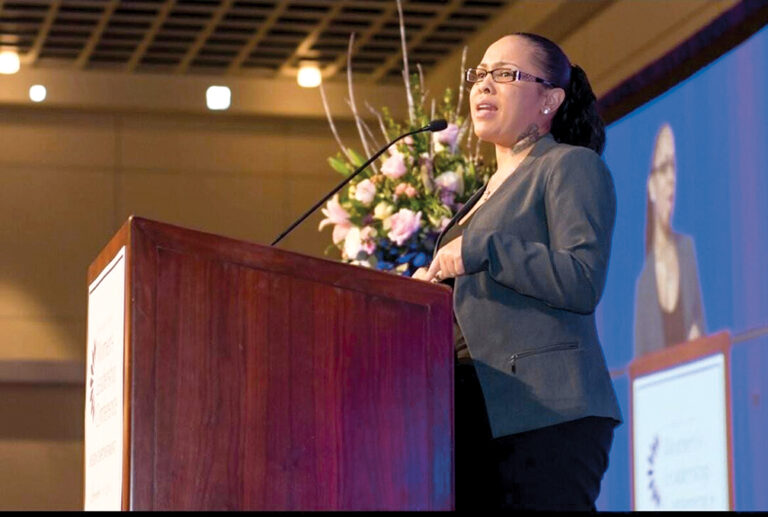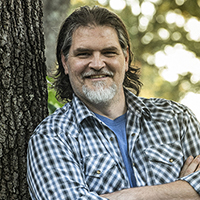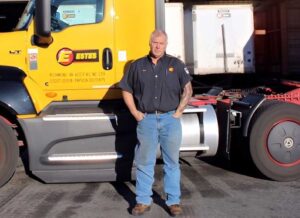The trucking industry must lead the way in the ongoing battle against human trafficking.
This is the message of one advocate who’s part of a California-based organization set up to address the problem.
Jessica Midkiff, a program development specialist and agency liaison for Los Angeles-based nonprofit Saving Innocence, has a unique perspective on the subject of trafficking. As a survivor of commercial sexual exploitation, a life that began before she’d even reached her teenage years, she’s an expert above all other experts on the subject.
Members of the trucking community play a vital role in the war against human trafficking, she says. Because of their ability to observe activities on the ground from the cabs of their trucks, every driver on the road today is in a position to help trafficking victims by reporting anything suspicious to authorities.
“Always keep your eyes open and pay attention,” she said. “A lot of drivers know that there are people that are exploited, whether adult or children, at the truck stops. They’re known as ‘lot lizards,’ right? If (truckers) see something, if they have an inkling, call it in, so that this person can get help. Because if you don’t, the next truck or car that person gets into could be their last.”
Midkiff, who was named Women In Trucking’s November 2021 member of the month, shared a little about her experiences during a recent conversation with The Trucker.
“I had been groomed since the age of at least three years old, experiencing the sexual conditioning and mental conditioning and so on,” she said. “Being groomed very, very young, experiencing a lot of abuse and then transitioning into being bought and sold on many different levels, (sexual exploitation) was all I thought I would be capable of doing.”
As unpleasant as her life was, getting out was a difficult proposition, given the years of conditioning Midkiff was exposed to. She said her experiences are fairly common among those lured and then trapped in a life of sexual exploitation.
“It is really, really difficult. I think it takes on average at least seven to nine (tries) to actually be able to successfully leave that life,” she said.
“There is a turning point for everyone, and it’s not the same,” she explained. “For me in particular, the turning point was I was going to die. I had a child by that time and my child was taken away from me, thank God, by a family member. I just knew that I wanted better for my child.”
Making the choice to get out was only the first step.
“There weren’t a lot of agencies around at that time when I was struggling to exit the life, and it took me a few months to successfully escape,” Midkiff recalled. “I didn’t want to die, and I didn’t want my child to be without her mother.”
Starting a new life was not a magical cure-all, she said.
“I still did not see the greatness in me; it was seeing the greatness in someone else,” she said. “I think I only started loving myself, literally, at the age of 30 or 31 — and I had gotten out in my early 20s. It took years.”
Given her experience, Midkiff is a powerful voice on the topic of human trafficking, a problem that continues to grow right under the noses of most Americans.
According to statistics in the 2021 Trafficking in Persons Report, published by the U.S. State Department, the Department of U.S. Homeland Security opened nearly 950 investigations related to human trafficking in fiscal year 2020, and the U.S. Department of Justice opened 663 additional investigations. The State Department and U.S. Department of Defense also investigated 95 and 160 cases, respectively. Thousands more cases were prosecuted at the state level.
Most of the federal investigations, except for those stemming from the Department of Defense, were for sex trafficking, formally redefined in the Trafficking Victims Protection Act of 2000 as a situation where “a commercial sex act is induced by force, fraud or coercion, or in which the person induced to perform such an act has not attained 18 years of age.”
Contrary to what many people believe, a victim does not need to be physically transported from one location to another for the crime to fall within this definition. In other words, a person who is being coerced to perform commercial sex acts, even at or right outside their place of residence, has the same status as someone who’s transported across county, state or international borders for the same purpose.
The trucking industry has long been tabbed as an important weapon against human trafficking, given the number of eyes that can be put on the problem from one end of the country to the other. Noticing what’s going on, as well as knowing what to do when something is observed, is key for the safety of both the victim and the Good Samaritan driver, Midkiff said.
“I would always strongly advise (drivers) not to get out and personally handle something themselves, because that puts them in danger,” she said.
“But they have the power of being in this huge circuit, where they’re all connected,” she continued. “If (a driver) sees a kid getting in a car and it may be an exploiter, an abuser, a purchaser or whatever the case is, and they’re on the road, (truckers) know how to communicate amongst themselves and to law enforcement.
“And, if a trafficked person comes to (a trucker) asking for help, they should definitely do what they can within their limits and their safety to help that person,” she said. “That one moment can change that person that’s being exploited. It can change their life.”
Midkiff, who has worked for Saving Innocence for six years, said the organization serves an average of 400 to 550 kids per year in the Los Angeles area alone.
She said part of her ongoing healing is through her work, which includes assisting victims directly. In addition, Midkiff has co-authored a book related to changing mind sets that perpetuate sexual exploitation.
While Midkiff said she’s gratified by recognition from WIT, her mission is about more than individual recognition.
“It’s just wanting to help,” she said. “I’ve always wanted to help, and I’m going to help ’til I draw my last breath. And hopefully I’ll have left behind a legacy big enough that there are people out there who want to do the same thing. These kids are really important.”
Because of her early experiences, Midkiff believes she can help others in similar situations.
“I think this is my assignment on this Earth. I went through something so horrible that a lot of people can’t make it back from it. I was allowed to go through this and learn from this and draw from it the best way I can to pay it forward,” she explained.
“At the end of the day, if I only was able to reach a few or only one, I still feel like I did my job,” she said. “We’re all human beings. We’ve all got to stick together. It’s not just a trafficking thing; it’s a human being thing. It’s a child thing that’s going to grow into an adult thing.”
To report suspected human trafficking, call 911 or contact the National Human Trafficking Hotline at 888-373-7888. To learn more about Saving Innocence, visit savinginnocence.org. To order a copy of Midkiff’s book, visit fightforme.net.
Dwain Hebda is a freelance journalist, author, editor and storyteller in Little Rock, Arkansas. In addition to The Trucker, his work appears in more than 35 publications across multiple states each year. Hebda’s writing has been awarded by the Society of Professional Journalists and a Finalist in Best Of Arkansas rankings by AY Magazine. He is president of Ya!Mule Wordsmiths, which provides editorial services to publications and companies.








